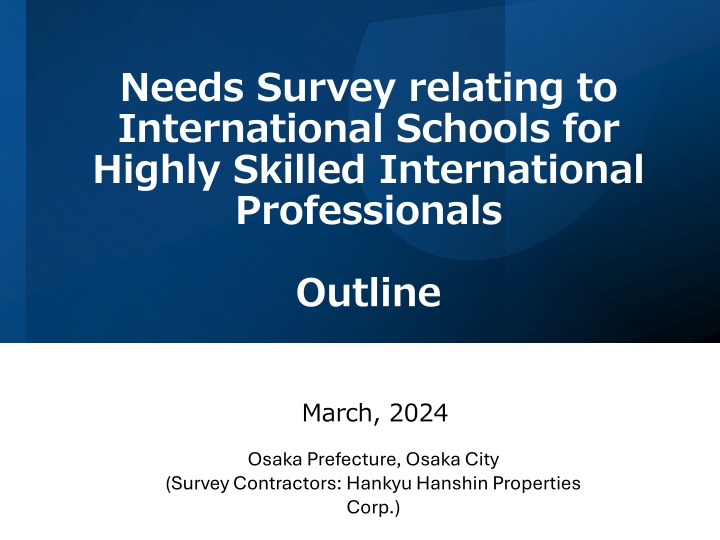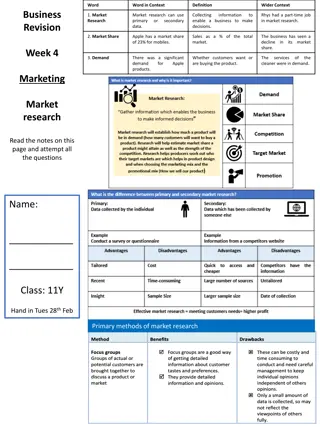
International School Needs Survey for Highly Skilled Professionals in Osaka
Explore the results of a survey conducted in Osaka, Japan, to determine the requirements for international schools for highly skilled international professionals. Gain insights into preferences, income levels, and future needs of households considering international education for their children.
Download Presentation

Please find below an Image/Link to download the presentation.
The content on the website is provided AS IS for your information and personal use only. It may not be sold, licensed, or shared on other websites without obtaining consent from the author. If you encounter any issues during the download, it is possible that the publisher has removed the file from their server.
You are allowed to download the files provided on this website for personal or commercial use, subject to the condition that they are used lawfully. All files are the property of their respective owners.
The content on the website is provided AS IS for your information and personal use only. It may not be sold, licensed, or shared on other websites without obtaining consent from the author.
E N D
Presentation Transcript
Needs Survey relating to International Schools for Highly Skilled International Professionals Outline March, 2024 Osaka Prefecture, Osaka City (Survey Contractors: Hankyu Hanshin Properties Corp.)
Outline A survey was conducted to understand the needs for international schools for highly skilled international professionals. The survey results will be used as the basic information to invite foreign capital financial businesses to Osaka and to establish living conditions. We surveyed those earning JPY15,000,000 or higher per annum, assuming highly skilled professionals are mostly likely to work with foreign financial businesses. We selected countries/regions (UK, Hong Kong, India, Singapore and China) which have developed as international financial cities where a number of highly skilled professionals are considered to live and many businesses have potential to be invited to Osaka. Then we surveyed those living in the countries/regions. Online surveys were conducted for those registered with the web survey company GMO research AI, Inc. to answer the questionnaire. Language: English only Purpose Target Method Period March 21, 2024 March 29, 2024 Number of responses Summary of Survey Results 425 Target number: 300 1 Attributes of Respondents Age brackets 30-39 and 40- 49 account for 60% of all respondents. Age Male accounts for 60% and Female 40%. Sex Other accounts for 40% which is the largest group and Finance, Insurance for 20%. Employer one 30-39 and 40-49 account for 60% of all respondents. works for 1
1Attributes of Respondentscontinued Individual Less than 25,000,000 JPY accounts for 60% of all respondents. annual income Annual Less than 30,000,000 JPY accounts for 50% of all respondents. household income Spouse and Children is the largest group (40%). Family structure Less than 30,000,000 JPY accounts for 50%. Less than 25,000,000 JPY accounts for 60%. 2 Respondents preference to send their children to an international school As for the question regarding the types of school your children go to (asked only to those with children, n-274) , All of my children attend an international school or Some of my children attend an international school account for 60%. Among households which send their children to local schools (n=109), 60% are considering changing to an international school . 60% answered All or some of my children attend an international school . 2
Facts about international schools and their future needs Facts about the international schools their children currently go to n=165 Commuter school accounts for 70% and Boarding school 30%. Among the households using a boarding school (n=43), the largest group use a boarding school from Elementary school equivalent (40%) and the second largest group use one from High school equivalent . Needs in the case they send their children to an international school n=65 Half of them like to use a Commuter school , 20% a Boarding school , and 30% answered Either is fine . Among the households that want to use a boarding school (n=15), the largest group want to use one from High school equivalent (60%) and the second largest want to use one from Junior high school equivalent (30%). Commuter/boarding school Among households that send their children to a commuting school (n=122), 70% answered less than 1 hour for commuting. Among households that want to send their children to a commuting school or answered Either is fine (n=50), 70% answered less than 1 hour for commuting. Distance to international schools Main opinion of the respondents Location of school and home are near not far. India/in her 40s It should be close to home so that it does not take long to commute. UK/in his 50s Well, proximity is a factor that I'll consider. UK/in his 20s) 90% answered less than 1 hour for commuting 70% answered less than 1 hour for commuting 3
Facts about international schools and their future needs(continued) Facts about the international schools their children currently go to n=165 The largest group answered Less than 30,000 USD (30%) followed by less than 20,000 USD (20%) Needs in case they send their children to an international school n=65 30% answered Less than 20,000 USD and another 30% answered Less than 30,000 USD . Tuition per student per year Main opinion of the respondents I hope the fee is affordable. (Sing apore/in his 50s) Good value for money (China/in her 20s) Price is low. (Hong Kong/in his 40s) Curriculum adopted by the school and International certifications held by the school are the factors chosen by the most respondents. Quality of teaching staff is the most important factor for the respondents, followed by Good for getting into university . Main opinion of the respondents Good quality of education great teachers. (UK/in his 20s) in selecting a school Important factors 2nd 2nd 1st A world class school with state of quality teachers. (India /in his 50s) 2nd 1st Provide the path to other colleagues and university overseas. (Hong Kong/in his 30s) Main opinion of the respondents It all depends on the quality of knowledge and skills the school imparts. (Singapore/in his 40s) 1. We used the weighted average method, where points were weighted for the top 3 factors in each question of important factors in selecting a school and the points for each option were divided by the number of respondents. Points allocation rule is: to give 3 points for the top option, 2 points for the second and 3 points for the third . 4
Preference for working overseas As for the question Please tell us where you would like to work , 40% answered Europe and another 40% other Asian countries than Japan . UK is the most preferred location in Europe (80%). In Hong Kong and Singapore, the most respondents answered other Asian countries than Japan (60% for each). As for the question Who has the authority to make decisions about work transfers within the family? , 90% answered If I had to choose, I do . As for the question If you were to work abroad, would you be accompanied by family or go alone? , 70% answered I would probably be accompanied by my family . In India, more respondents answered they would be probably accompanied by their family which account for 80%. As for What is the most important to you about living environment of your overseas working place? , the most respondents answered Residential environment (60%), followed by Medical treatment environment (20%). In UK, educational environment was chosen by many respondents (20%) while in China Medical treatment environment accounts for a high percentage (50%). As for How important is the educational environment of the place you are transferring to? , very important and important account for 80% of all respondents. In UK, more respondents answered either very important or important (90%). As for Assuming you would like your child to attend school at your overseas workplace, would you prefer a local school or an international school? , 60% answered International school . In India, an even higher percentage answered International school (80%). As for Does your employer provide any assistance for international school attendance? , many answered Yes (60%) and the number of respondents answering No is smaller. In China, the percentage of respondents answering Yes is larger (90%). n=425 Main opinion of the respondents I would choose a reputed international school for my child's education in case of an international job transfer. I'll ensure my child's future is in good hands. (India/in his 40s) Preference for universities As for preferred universities to go to , the most respondents answered Prestigious universities in Europe/U.S. (70%) followed by Other public universities in Europe/U.S. (40%). In UK, the percentage of Prestigious universities in Europe/U.S. is larger. In India, "Prestigious universities in Europe or the U.S." (70%) accounts for the largest proportion, followed by "Other public universities in Europe or the U.S." (50%) and "Prestigious Japanese universities" (45%). Answered by households with children, n=274 5
III Conclusion Based on the survey results, we reached the following conclusion for the needs relating to international schools for highly skilled international professionals: 1. Demands for international schools in case of getting transferred As seen in the survey, many households of highly skilled international professionals send their children to international schools. Even among those who currently send children to local schools, more than half of them are considering changing to an international school. As for preference for the type of schools they want their children to attend in case of working overseas, more than half want them to attend an international school. For the reasons mentioned above, we consider international schools will be in high demand if more highly skilled international professionals come to live in the Kansai area. 2. Preferences in selecting international schools Type of commute and location More households prefer commuting schools. A certain number of households prefer boarding schools. For the length of commute, less than 1 hour is preferred. Locations with good transportation access and safe environment are preferred. Cost As for tuition, 30,000 USD or lower is preferred per year. Contents of services High quality curriculum and international certifications are necessary. At the same time, there is a demand for Japan s own educational contents such as discipline, politeness, good manners, consideration to others, respect for traditional cultures, as often seen in Japanese people s behavior, and multicultural education including interaction with local communities, etc. Quality of teaching staff and the number of students entering universities are also considered important. Disseminating information on these factors is also important. Reference Quality of teaching staff is the factor that caregivers consider important (according to the survey results). According to International Schools Database, placement of native teaching staff is also very important as well as specialty and experience of teaching staff. Native teaching staff here means being a native speaker of the curriculum provided at school. For example, if a British curriculum is provided in Osaka, native English speakers are preferred. URL: https://www.international-schools-database.com/articles/most-important-features-of-international-schools As for the language mainly used in class, most respondents prefer English . However, we also need to consider introduction of foreign language education other than English . What we found out in their remarks is they seem to prefer promotion of multilingual education so they can meet the needs of students with various backgrounds. Schools are also expected to introduce Japanese and other languages of students with different cultural background in addition to English. 6 Prestigious universities in Europe/U.S. are strongly preferred for higher education. It is important to make sure that there is a course of advancing to a higher education at universities in Europe/U.S..






















